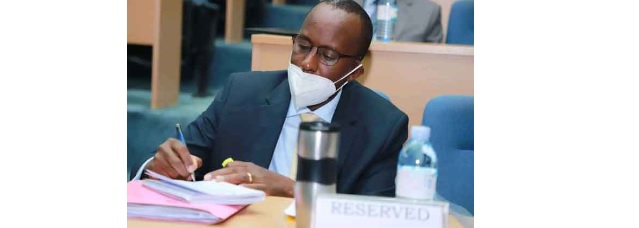
The taxman recorded Shs900bn short fall in the first six months of FY2021/22
Kampala, Uganda | JULIUS BUSINGE | Uganda’s taxman failed to hit its revenue target collections for the first six months of this fiscal year but hopes to record improvements in the remaining period.
Latest statistics from Uganda Revenue Authority shows that it recorded Shs10.1tn as revenue for the six-month period ending December 2021 for the Financial Year 2021/22, which is below the target of about Shs11tn. The shortfall was blamed on coronavirus pandemic disruptions on economic activities.
While this represents a Shs900bn short fall, the revenue collection increased by Shs 1.4tn compared with the same period in the FY 2020/21. URA is expected to collect Shs 22.4tn this financial year which is 16.8% up compared to that of last financial year.
URA’s Commissioner General John Musinguzi Rujoki said domestic tax revenue collections stood at Shs6.2tn against a target of Shs7.1trillion, representing a shortfall of Shs951bn.
He said that the shortfalls were from direct domestic taxes (Shs273bn), indirect domestic taxes (Shs487bn) and non-tax revenue (Shs190bn). About 20% of the domestic tax shortfall was from non-tax revenue.
However, direct tax collections for the period grew by a paltry Shs62bn compared to the same period in the FY 2020/21. Pay and You Earn (PAYE) recorded a surplus of Shs156bn in revenue collections riding on arrears collections, increase in staff numbers in some sectors like finances and streamlined government payment process that facilitated prompt PAYE payment.
Casino’s and tax on bank interest too, recorded Shs8.8billion and Shs1.6billion, respectively, in surplus owed to recovery of tax arrears.
On the other hand, tax collections from international trade or customs collections stood at Shs 4trillion against target of Shs 4.1trilion citing reduction in imports and exports of products like motor vehicles, worn clothing, insecticides, oil seeds and oleaginous fruits.
Sector performance
Sector wise, 75.5% of the revenue collected was generated from the usual top five sectors with wholesale and retail trade sector having the most significant contribution, amounting to Shs3tn. This was followed up with the manufacturing sector contribution of Shs2.4tn, financial activity sector Shs1tn information and communication sector Shs880bn (8.55%) and public administration contributed the least in this line (3.75% in percentage terms).
The wholesale and retail trade segments recorded a growth in revenue collections owed to increased sales in solid, liquid and gaseous fuels and related products.
Information and communication, gas, steam and air conditioning, real estate, and construction sectors recorded a drop in revenue collections as a result of a slowdown in economic activities.
Other insights
VAT recorded surplus on imports by Shs155bn, petroleum duty by Shs8.7bn, a surcharge on imports by Shs6billioR and excise duty by Shs0.38bn.
However, import duty recorded significant short fall worth Shs101billion, withholding tax by Shs20bn, temporary road licenses by Shs9.6bn, infrastructure levy by Shs7bn and export levy worth Shs57bn.
The imposition of 5% tax on a kilogram of processed gold, 10% on the value of unprocessed minerals and the imposition of a tax on fish maws and leaf tobacco triggered no export of processed gold and a sharp reduction in export of fish maws and unprocessed minerals.
Tax register number up
URA’ tax register widened with the addition of 182,553 new taxpayers during the period under review. This widened the tax base to 1.96millon tax payers, consisting of 150,849 non-individuals and 1.81million individual taxpayers. Of the new taxpayers, at least 33,341 became valuable taxpayers raising Shs13bn in taxes.
Going forward, URA hopes to collect Shs12.3trillion for the second half of this year which accounts for 55% of the annual target. But for January alone, taxman collected Shs1.7tn against target of Shs 1.9tn.
Rujoki revealed plans to hit two million tax payers soon as one of the measures to boost revenue collections.
He said the URA’s other focus are; enforce tax laws, increase tax education, improve client support and integrate with other government systems for 3rd party data integration and analysis, simplify processes like having instant TIN and strengthen implementation of digital tax stamps and electronic fiscal receipting and invoicing solution.
Rujoki said URA will also improve mobile tax offices to increase accessibility of URA services through the Tujenge Bus.
“The journey to Uganda’s economic independence is a collective effort of every citizen…now that the economy has fully opened, let us agree to walk together so as to develop our country because every one’s support matters.”
Jane Nalunga, the executive director for SEATINI Uganda told The Independent that the reopening of the economy and the Rwanda – Uganda border are key to support URA improve performance in the remaining period.
But she quickly added that “the government has to balance between not suffocating businesses and getting revenue.”
Nalunga said the current government discussions on tax bills should be done in close consultation with the private sector to ascertain viable taxable areas.
****
 The Independent Uganda: You get the Truth we Pay the Price
The Independent Uganda: You get the Truth we Pay the Price





